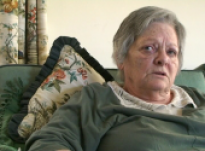Goldie - Interview 6

Age at interview: 80
Brief Outline: Goldie was diagnosed with breast cancer in 1989, which was successfully treated. Five years later she was diagnosed with lymphoedema, which she manages with a combination of exercise and arm sleeves. She has since had a knee replacement.
Background: Goldie is married, retired and had 3 children. Ethnic background/nationality: mother Russian/Lithuanian, father Russian/Scottish
More about me...
Goldie was diagnosed with breast cancer thirty years ago in 1989 and remembers a childhood with ‘ghastly stomach pains’. The breast cancer was treated successfully with radiation but five years later after swelling in one arm, Goldie was diagnosed with lymphoedema. After some unsuccessful treatment locally, Goldie was referred to hospital where she was taught to exercise daily and wear an arm sleeve and glove. Goldie manages the lymphoedema well with these two treatments and has the support of a very good lymphoedema nurse. In the past ten years Goldie has had a knee replacement and is now registered as disabled.
Goldie thinks her positive attitude has helped her to deal with her health issues. She was brought up by parents who thought women should be educated to the same level as men, which was unusual for the time. She has trusted the health professionals who have treated her and taken the approach of not looking for additional information. While Goldie has not had genetic screening she would like to know the cause of the breast cancer.
Both Goldie and her husband have become less observant of Jewish practices over the years. Goldie continues to keep the dietary laws more or less. She doesn’t have a kosher butcher, for example, but does not eat treif (non-kosher food) or mix milk and meat at home. Her husband is now against any form of organised religion. Goldie feels that being Jewish is an important part of her identity racially rather than religiously and will have a Jewish burial in the family plot in Golders Green.
Goldie was able to get a £750 grant from the Department of Health via two other support organisations to help her cover extra costs from having had breast cancer.
Goldie was able to get a £750 grant from the Department of Health via two other support organisations to help her cover extra costs from having had breast cancer.
SHOW TEXT VERSION
PRINT TRANSCRIPT
And now, you say you’ve got it you’re managing it very well with the sleeves and …?
Oh and I’m very lucky basically. If I had to have it at all I’ve been extremely lucky. I belong to an organisation called RAGE.
Right.
Yes, and I’ve been given just recently by the Department of Health partly through RAGE and partly through MacMillan £750, you know, people who are suffering the effects of breast cancer.
oh.
Have you heard of this?
No.
Well you might tell other people about it.
Can you tell me a bit more about it then?
Well it’s people who’ve got lymphoedema basically and are sort of suffering and there are various things you can’t do because of this. And RAGE nagged the Department of Health and I think the MacMillan people did as well. And the Department of Health will give you £750 to help you, you know, with anything you’d like extra. And they’d like to know at the end of the year what you’ve spent it on. And, they say, you know, you don’t have to produce receipts or anything they just could like to know. And I mean, for instance, I’m spending it on more help in the house or, and garden, that sort of thing and having my toe nails cut [laughs].
Oh that’s nice. Yes.
You know.
And is it a one off payment?
It’s a one off payment, yes.
Goldie was shown how to do exercises for twenty minutes a day to help control her lymphodema.
Goldie was shown how to do exercises for twenty minutes a day to help control her lymphodema.
SHOW TEXT VERSION
PRINT TRANSCRIPT
Well again, I’m very lucky, because what happens is your arm, or whichever side you’ve had this swells up terribly, and a lot of people have tremendous pain with it. And can’t even use the arm, and from that point of view I am very lucky because I’ve no pain. I can use the arm, and as long as I do my exercises for it fairly regularly, I mean I can miss a day here and there, but you know, not more than two, it keeps the swelling down. Whereas a lot of people, you know, they have tremendous trouble with this.
And can you explain what the exercises are? How long do the exercises take you each day then?
Well normally they take me about quarter of hour, twenty minutes in the morning which always means I can never get away anywhere early. You know, and it can consist of rubbing your, not rubbing exactly stroking across away from the arm and across the breast and then eventually under the breast and then there are breathing exercises, you go [intake of breath] like that, and hold it for two, and then down and hold it for two. And you do that four times. And then for reasons I don’t entirely understand you have to rest for two minutes and not do anything, and as I said as long as I keep on doing this it keeps it down and in order.
So it’s nothing you can cure then?
No it’ll never cure and I don’t have to wear the gloves and sleeves in bed at night, but I do wear it all day. And people say, “It must be terribly hot in the summer.” Well I suppose it is, but you get used to it.

